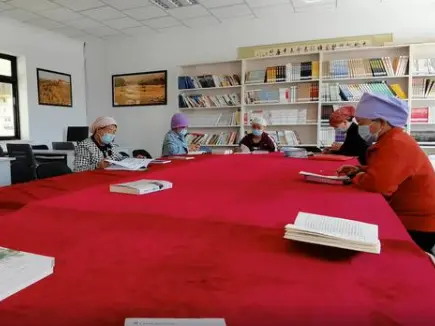In 10 years, 40-year-old Ma Huijuan wrote over 1 million words in books and articles with 13 cellphones.
"All my cellphones broke because I used them too much. This is my 14th cellphone. I am famous as a book lover as well as a phone killer in my village," Ma joked.
Ma lives in Yuchi Village in northwest China's Ningxia Hui Autonomous Region. When finishing her farm work and housework, Ma reads and writes on the phone every day.
Ten years ago, Ma, with only a junior high school diploma, started to record the daily joys and sorrows of rural women around her on Qzone, a Chinese social networking website.
"Rural women bear a lot of pain to make a living, but they seldom complain. They work very hard to live a better life," Ma said. "I want to record their mental power and tenacity."
For other villagers, earning a living was far more important and practical than reading a book. Ma's keen interest in books was not understood at the beginning.
Villagers' attitude did not change until Ma published her first article and received a payment. After publishing five books, she was given the title of "writer of thumbs" by her fellow villagers.
On Thursday, Ma's new book, depicting the twists and turns of dozens of villagers who relocated from their inhabitable homelands and shook off poverty, made its debut.
"Villagers around me are my character prototypes. I have been thinking for 10 years to write a story about the relocation experience of Chinese farmers, to show their honesty, integrity and undauntedness in the struggle against fate," Ma said.
"I finally made it," Ma excitedly said.
Ma's hometown Heiyanwan Village, about 300 km from Yuchi, was an impoverished mountainous village in Xihaigu, which was once regarded as uninhabitable for humans due to frequent drought and poor soil.
"Women in Heiyanwan tried everything such as digging up edible wild herbs to feed their children and keep them alive," Ma depicted the poverty and hunger in the book.
In the poverty-stricken village, although it was harder to borrow books than money, she never stopped reading.
"Books light up my life. When I was young, I never thought of being a writer. All that I dreamed was to see the world beyond the mountains," said Ma.
"Luckily, I was able to imagine what the outside world was like by reading books," Ma said.
Early this century, China started large-scale ecological relocation programs as part of the country's efforts to eradicate poverty.
Ma and her family are among the beneficiaries.
In 2001, they left the mountain village and settled in Hongsipu District, which has now become one of China's largest settlement areas for people relocated from inhospitable areas, with a population of over 200,000.
In her new hometown, Ma was elected as the head of the village's cultural center for her enthusiasm for books, and also a deputy to the National People's Congress, China's top legislature.
She also established a library and a reading club in her village in 2018 with the help of the local government. As many club members are illiterate, she first taught them to read.
"Reading is not a purpose, but it can let them know their life could be different. It can also expand their mental horizons and inspire their children to study more," said Ma.
Ma now post articles on her official WeChat account, which has attracted more than 10,000 followers.
"I'm happy that so many people like my articles," she said. "Life is wonderful. I will keep writing to record the beauty of life."
 简体中文
简体中文

